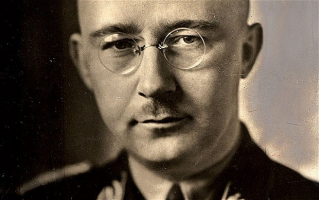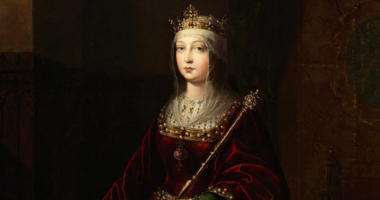Top 9 Interesting Facts about Gaius Marius
There are interesting facts about Gaius Marius that you may not have known. He was an important politician and military leader who oversaw a number of major ... read more...changes during his lifetime. He was also the most influential person in the history of the Roman Empire. Therefore, whether it is BC or the present, people still remember the name of a talented politician like Gaius Marius.
-
South of Latium in Italy, near the city of Aprinum, Gaius Marius was born in 157 BC. Shortly before his birth in 188 BC, the town was taken by the Romans in the late 4th century BC and first given Roman citizenship without the opportunity to vote. Plutarch reports that Marius' father was a laborer, but given that Marius had connections to Rome's nobility, stood for local office in Arpinum, and had several other notable accomplishments, it is probably certainly untrue. He was likely born into a prominent local family with equestrian rank, based on his marriage ties to the local nobility in Arpinum.
Even as a young man, Marius was not poor or even middle class; he was most definitely born into inherited wealth, most likely derived from holding substantial amounts of land. However, many of the difficulties he encountered during his early career in Rome demonstrate how difficult it was for a "new man" to be accepted into the upper classes of Roman society.
In reality, his family had more than enough money to sustain not just one member of the family in Roman politics, but two: Marius' younger brother, Marcus Marius, also became involved in politics in Rome.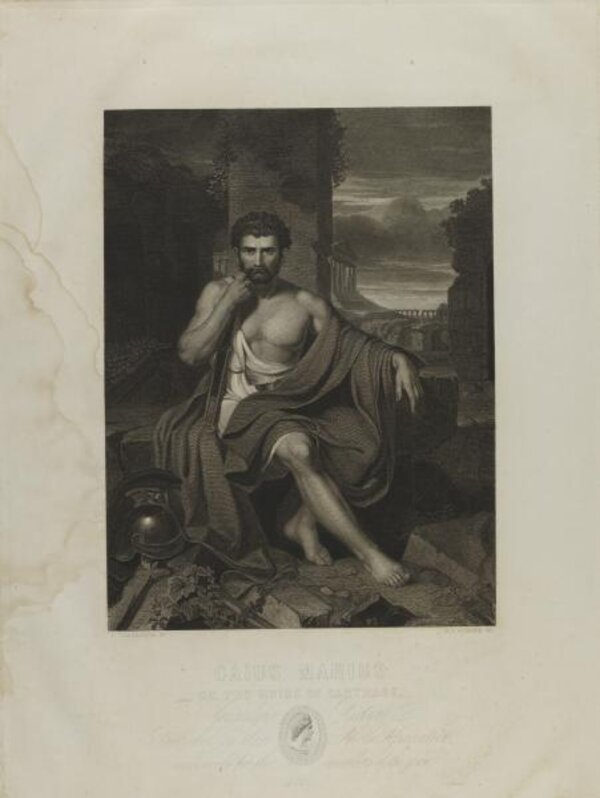
Photo: https://s3.amazonaws.com/ 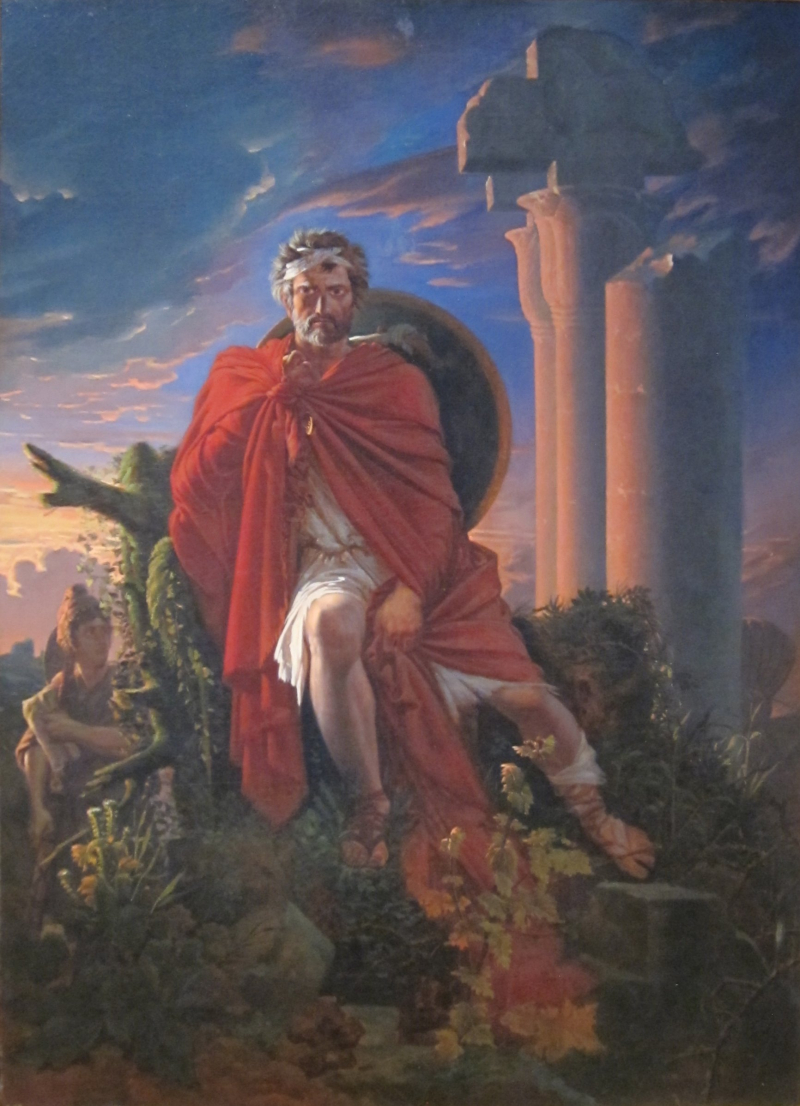
Photo: https://cdn.history.com/ -
Gaius Marius first enlisted in the military in 134 BC when he joined Scipio Aemilianus' legion on an expedition to Numantia as an officer for the expedition to Numantia. Marius later rose to become one of the most significant figures in Roman history.
When Aemilianus arrived, it is unknown if Marius was already there and working with the previous commander in Numantia. His military prowess caught Scipio Aemilianus' attention while he was serving in the army at Numantia. When the topic of the generals came up during the after-dinner talk and someone questioned Scipio Aemilianus about where the Romans would find a deserving successor, the young Scipio reportedly gave him a gentle pat. Gaius Marius is regarded by Scipio, who is portraying Marius, as a future leader, and this assessment is a precursor to what is to come for Marius. Scipio says: "Perhaps this is the man."
It appears that Marius had aspirations for a political career in Rome from the start of his military career. Marius ran for election as one of the two Forty-four special military courts of the first four corp bodies, according to Plutarch, as a hereditary client of Caecilii Metelli, one of the aristocratic families that were at the time rising as the dominant group in Rome.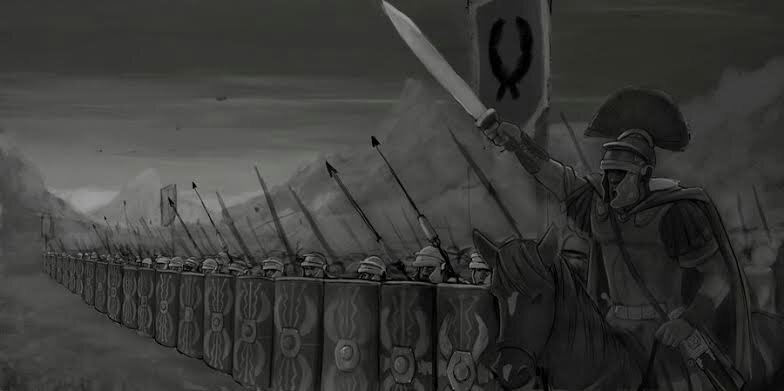
Gaius Marius entered his first military service in 134BC - Photo: https://pm1.narvii.com/ 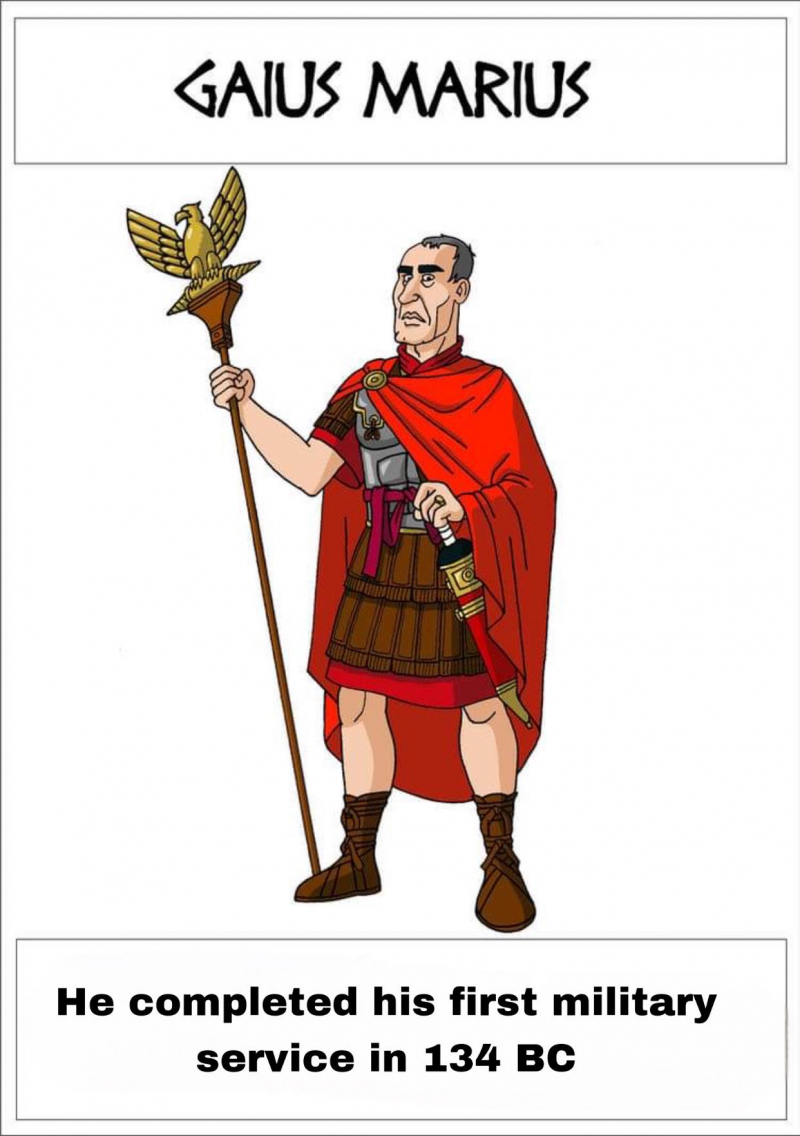
Photo: https://i.pinimg.com/ -
Gaius Marius initially entered politics in 119 BC after achieving success in the military and cultivating some favorable relationships with Rome's elite. Due to his outstanding work in the position, he was later given the responsibility of leading the province of Spain.
Marius was reinstated as a plenipotentiary for the upcoming year in 120 BC. Metelli, specifically Lucius Caecilius Metellus Dalmaticus, helped him win. Although Plutarch claims that Metelli was a hereditary patron of his family, this claim may be a modern exaggeration. Prospective consuls frequently run campaigns for their preferred court nominees in an effort to lessen the possibility that opposing courts will use their veto power.
In 119 BC, he was elected to lead the election, and he enacted regulations that limited noble interference in elections. Following his election as praetor in 115 BC, he was appointed governor of more Spain, where he waged a war against outlaws. After his trip to Spain, he wed Julia, Julius Caesar's aunt.
Although some of his earlier decisions may have incensed certain groups of the populace, Marius was already recognized as a clever and inventive politician. The changes he makes are usually regarded as positive developments.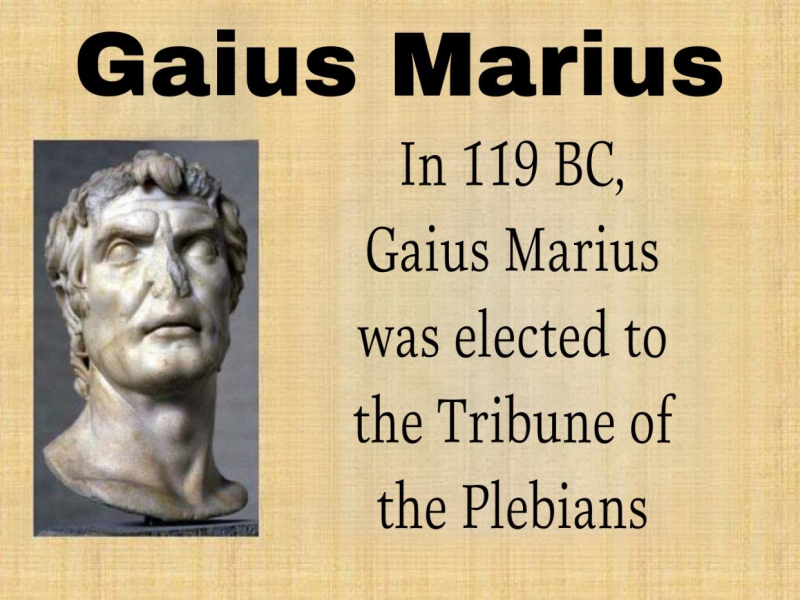
Photo: https://i.pinimg.com/ 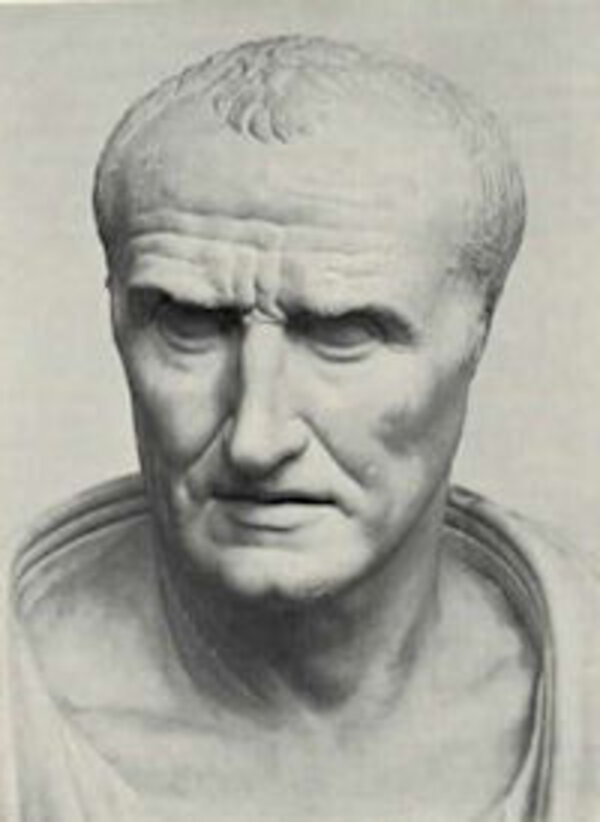
Statue of Gaius Marius - Photo: https://www.globalsecurity.org/ -
One of Gaius Marius' biggest wins came from the prolonged struggle with Jugurtha, king of Numidia, which troubled the Romans. After taking a break from politics, Marius came back to Rome and ran for the consulship right away. Once this was accomplished, he started to alter the organization of his army and went back to Numidia to vanquish Jugurtha.
At the end of 107, he ambushed Jugurtha with a perilous desert march to Capsa in the extreme south, where, upon the town's surrender, he slaughtered all the adult males, captured the remaining survivors, sold them into slavery, and burned them to the ground before giving the spoils to his soldiers. He kept up the pressure and drove Jugurtha's men into Mauretania from the south and west.
Marius' strategy worked, as his troops took Jugurtha prisoner and transported him to Rome, where he would perish. Following their victory, Sulla and Marius debate over who deserves the honor of having taken Jugurtha. The credit belongs to Marius because, according to Roman custom, Sulla was acting as his subordinate. Sulla and his honorable allies, however, turned their attention back to Sulla's direct involvement in undermining Marius' victory.
According to Plutarch, this was the "first seed" of their "incurable hatred". An interesting fact about Gaius Marius is that this is considered one of the most important victories in Marius' life.
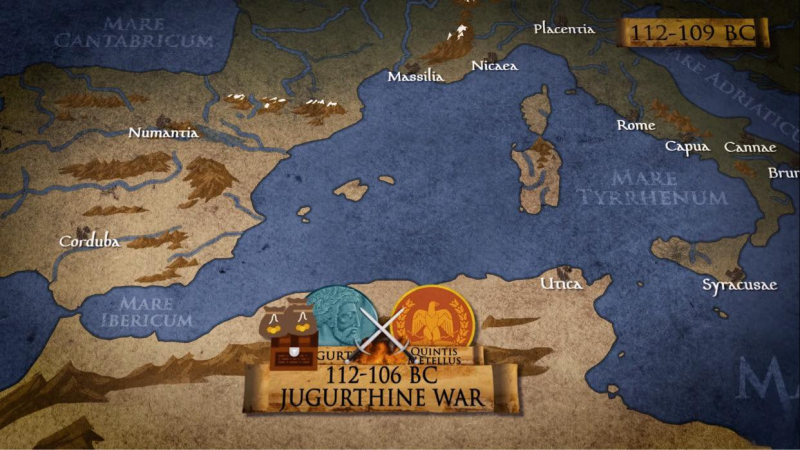
Map of the battle of Jugurthan War - Photo: https://vignette.wikia.nocookie.net/ 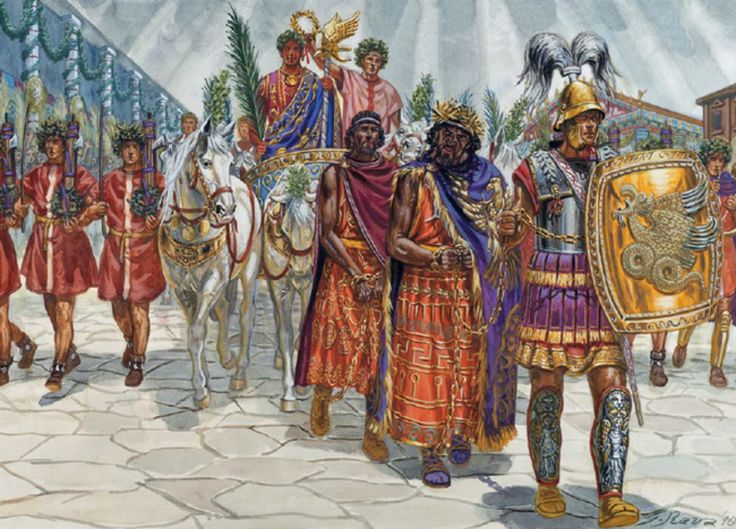
Gaius Marius's victory in the Jugurthan WarPhoto- https://i.pinimg.com/ -
A talented man like Gaius Marius has been elected 7 times, one of the interesting facts about Gaius Marius. He is well-known for winning seven consecutive elections for consul in Rome, which was a record at the time. One of his most significant political decisions was to outlaw the ownership of land in exchange for military service when he was first elected to the position of consul in 107 BC. From 104 BC until 100 BC, he was thereafter elected five times in a row.
Marius, a mandarin, triumphantly returned from Africa, awe-inspiring Jugurtha and the wealth of North Africa. Marius was chosen as consul in 104 BC and then re-elected in 103 BC. Although he was still allowed to serve in that capacity, it's possible that the electorate chose him again to prevent a repeat of the conflict over Caepio and Mallius' command.
It's possible that Marius and his troops killed everyone in their way, contrary to what Cassius Dio and Plutarch claim, but Cinna and Marius are equally to blame for the deaths and destruction of the forum. The political opponents were more likely to be terrorized by the deaths. The elections depicted were held in 86 BC, and Marius and Cinna were unconstitutionally chosen by the Comitia Centuriata. The candidates appeared terrified. This final selection of his, which occurred just before his passing upon his return to Rome in 86BC, fulfilled a prophecy attributed to his adolescence.
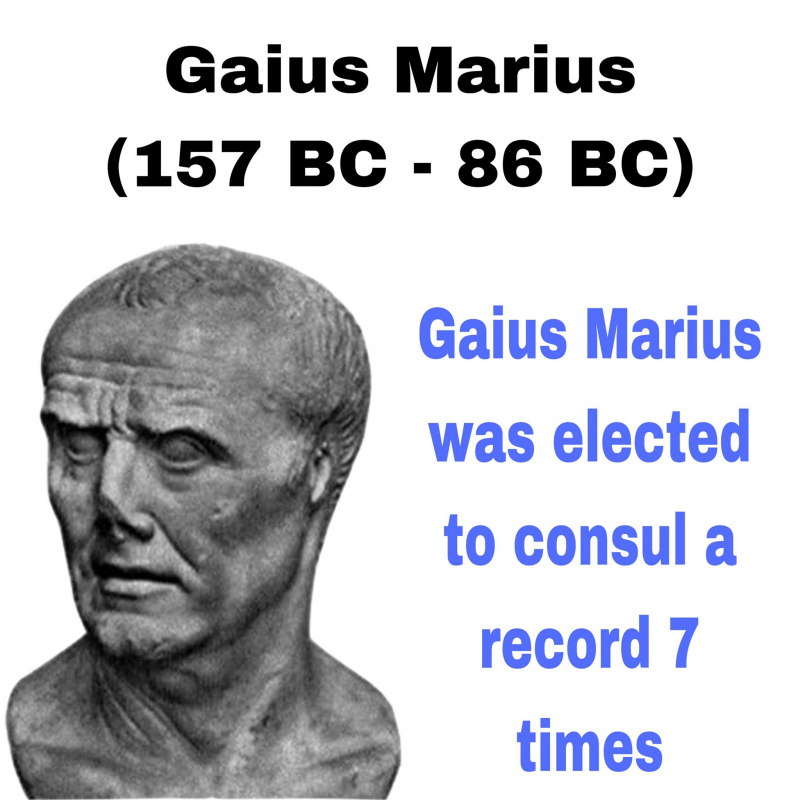
Photo: https://www.shorthistory.org/ 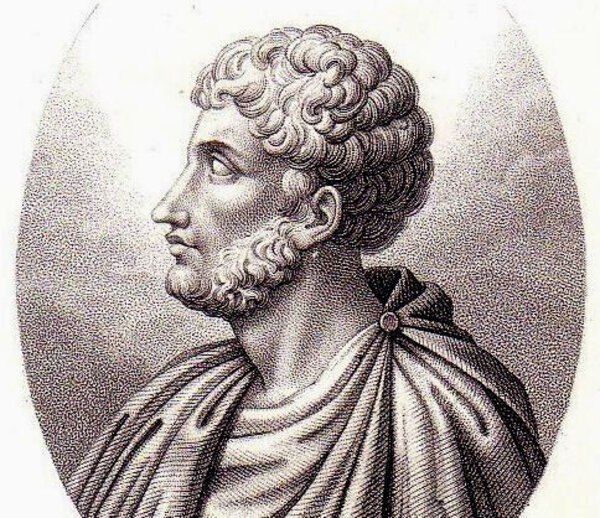
Photo: https://www.luciuscorneliussylla.fr/ -
Gaius Marius has garnered a lot of praise for his creative approach to the military during his long career as an army commander. During the war in Africa with Jugurtha, Gaius Marius made one of the army's most noteworthy innovations. During this time, Marius let Romans from all social classes including the lower classes enlist. This was regarded as a great honor for persons from less fortunate families and it significantly expanded the number of his army. Despite initial public criticism, the Roman army eventually adopted this maneuver as a normal procedure.
Marius revised his men's logistics and training during his subsequent consular visits. Marius ordered his soldiers to carry all of their supplies, guns, blankets, and clothing rather than using baggage trains. Due to this, ancient Roman troops were known as Marius' mules.
He also enhanced the pilot, a javelin that, after being enhanced, will bend to the point of becoming useless when hurled at foes. Although Marius is credited with many innovations during this time, there is no proof to back up the assertion that he was the one who altered the army's tactical unit from madman to cohort.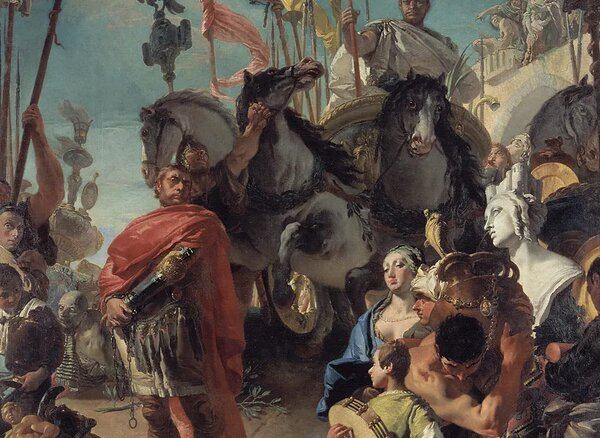
Marius' victory in military reform - Photo: https://about-history.com/ 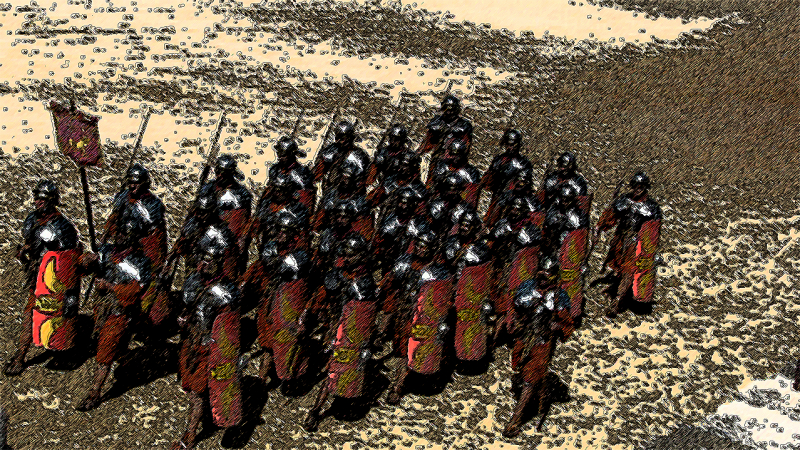
Marius's military reform in the selection of soldiers - Photo: https://cpb-us-w2.wpmucdn.com/ -
Chaos erupted in Rome in 91 BC following a brief period of peace following the murder of the court's Marcus Livius Drusus. This sparked a revolt in Rome and what came to be known as the Social War. A Roman army under the command of Gaius Marius was ordered to battle the insurgents. He achieved this, but he only made it through one campaign before giving up.
He got into a fight with the Roman general Sulla, and as a result, he was banished to Africa in 88 BC. During the Octavius War, Marius returned to Italy, invaded Rome, and unleashed a brutal reign of terror that culminated in his election as consul for the seventh time and his subsequent demise at the start of his term, in 86 BC.
Marius had withdrawn or left the battle by 89 BC. Either he genuinely was ill, or he retreated and claimed to be unwell because he felt underappreciated. It's also possible that the government did not extend his order when it expired in late 90 BC because it had failed, or that they gave him a life-saving deal: retire, leave, and get medical care.
His life and work helped Rome become an empire by upending the several conventions that held the aspiring elite of the Roman republic together and by founding a faction that was devoted to its leaders rather than the republic.The reason for his retirement is said to be that he had health issues, but many academics think it was a political decision because Marius was under a lot of pressure to treat his main opponents at the time.
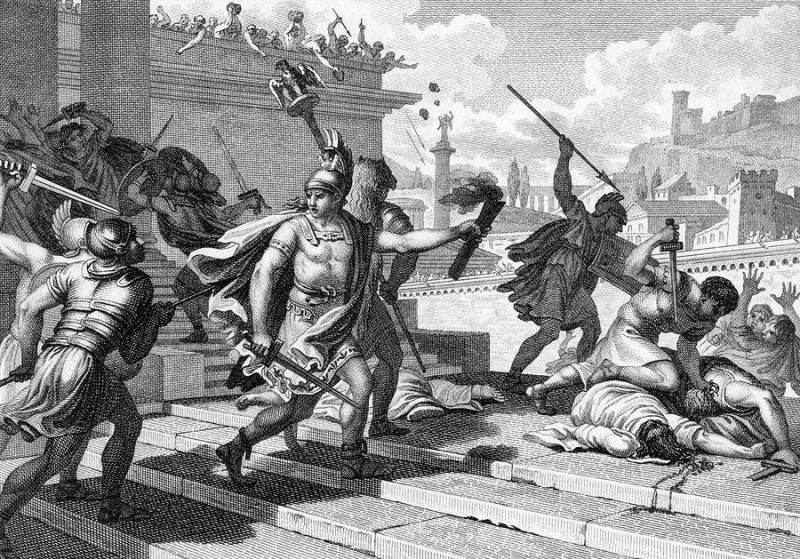
Marius in the Social War - Photo: https://fineartamerica.com/ 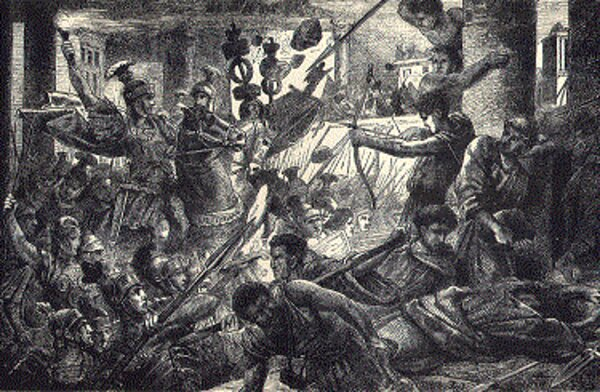
Marius in the Social War - Photo: https://s3.amazonaws.com/ -
You will be surprised that he was married to Julius Caesar's aunt, one of these interesting facts about Gaius Marius. He wed Julia, who was the daughter of Gaius Julius II, the sister of Gaius Julius III, and later Julius Caesar's aunt. Although the Julii Caesares family was patriotic, it didn't seem possible that they would advance past the position of praetor to become consul at this time. Only once, in 157 BC, did Julii do this in the second century. Both parties gain from the union: Marius gains respect by wedding into a patriarchal family, while Julii gains a lot of money and energy. Whether Marius ran in the yearly election of former magistrates for the position of the consul is unknown, but, likely, he lost at least once.
Gaius Marius' status as a significant influence in Roman society was firmly cemented by their marriage in 110 BC. After many years of blissful marriage, the couple had a son, Gaius Marius the Younger, who was chosen to serve as consul in 82 BC but also committed suicide that year. Julia passed away in 69BC, having outlived her spouse. Her grandson, Julius Caesar, emotionally read a letter to pay tribute to his aunt at her funeral.
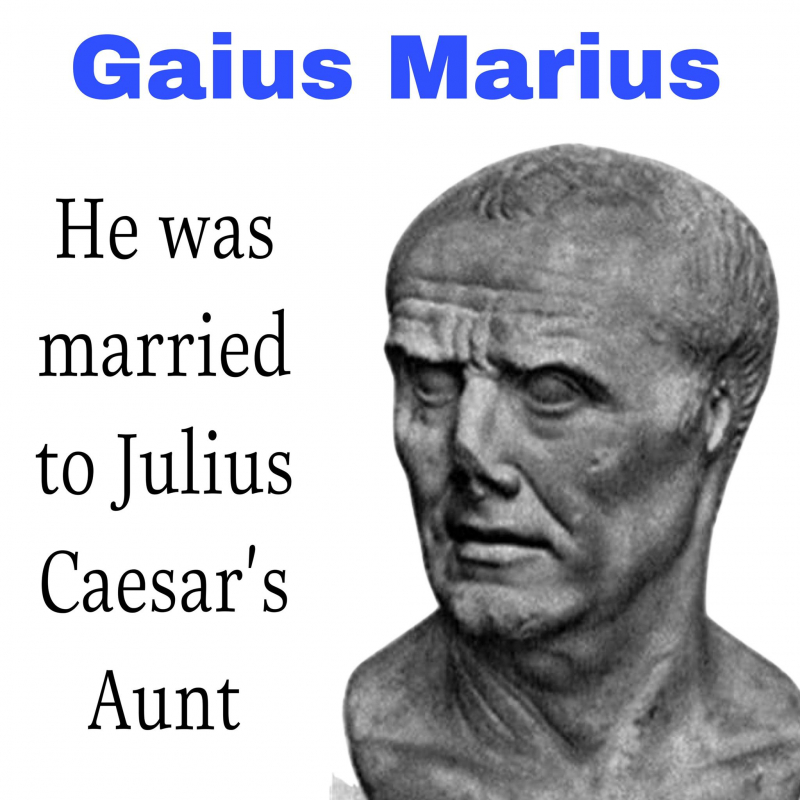
Photo: https://i.pinimg.com/ 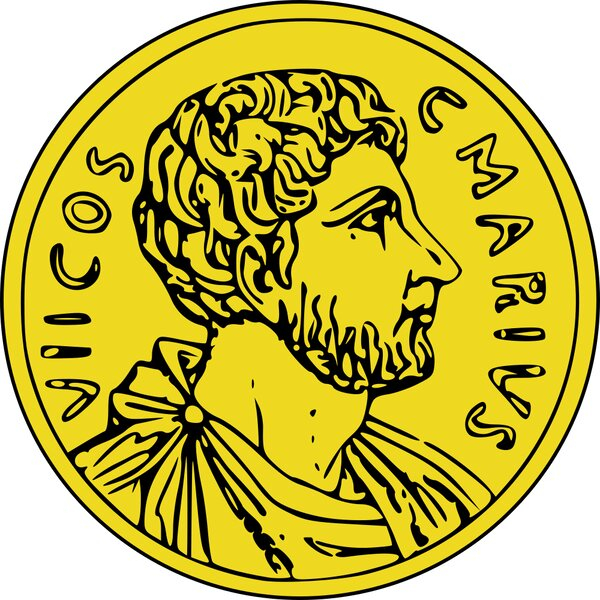
The image of Gaius Marius on the coin - Photo: https://assets.onlinelabels.com/ -
Marius had spent her entire life becoming embroiled in some sort of battle, and his later years were no different. Days after taking office for the seventh time, he started to lose focus and display symptoms of illness. Due to this, he passed away at the age of 70 just seventeen days after being elected. Gaius Marius's cause of death has been the subject of much conjecture, but the most widely accepted theory is that he acquired pleurisy and passed away as a result of it.
Gaius Piso recalls that Marius went on a stroll with his friends and told them about all of his accomplishments, adding that no wise man should allow himself to become wealthy. Later, an unnamed source cites Plutarch as saying that Marius started acting as he would on the battlefield after having a period in which he falsely believed he was in charge of the Mithridatic War. Last but not least, Plutarch recalls that once an ambitious man, Marius bemoaned in his hospital bed that he had not accomplished all that he could, despite having amassed a large great estate and been selected as consul more frequently than any other man before him.
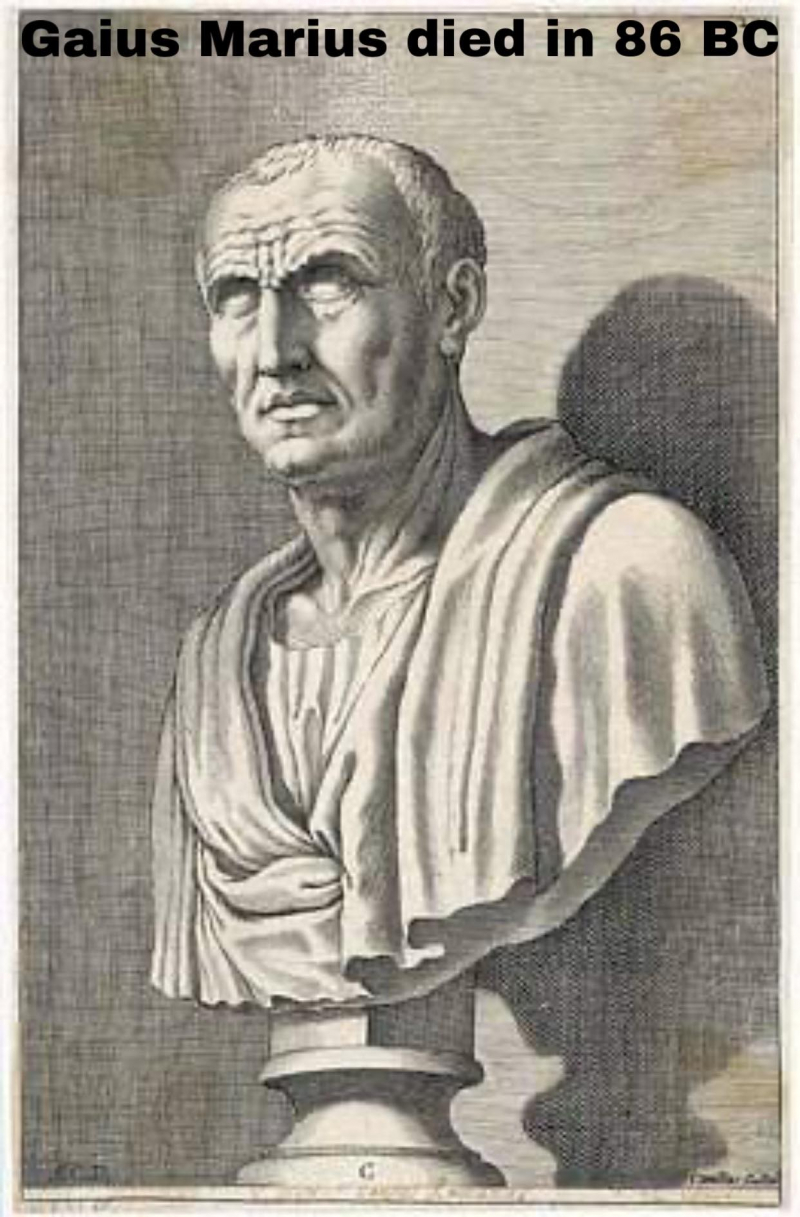
Photo: https://i.pinimg.com/ 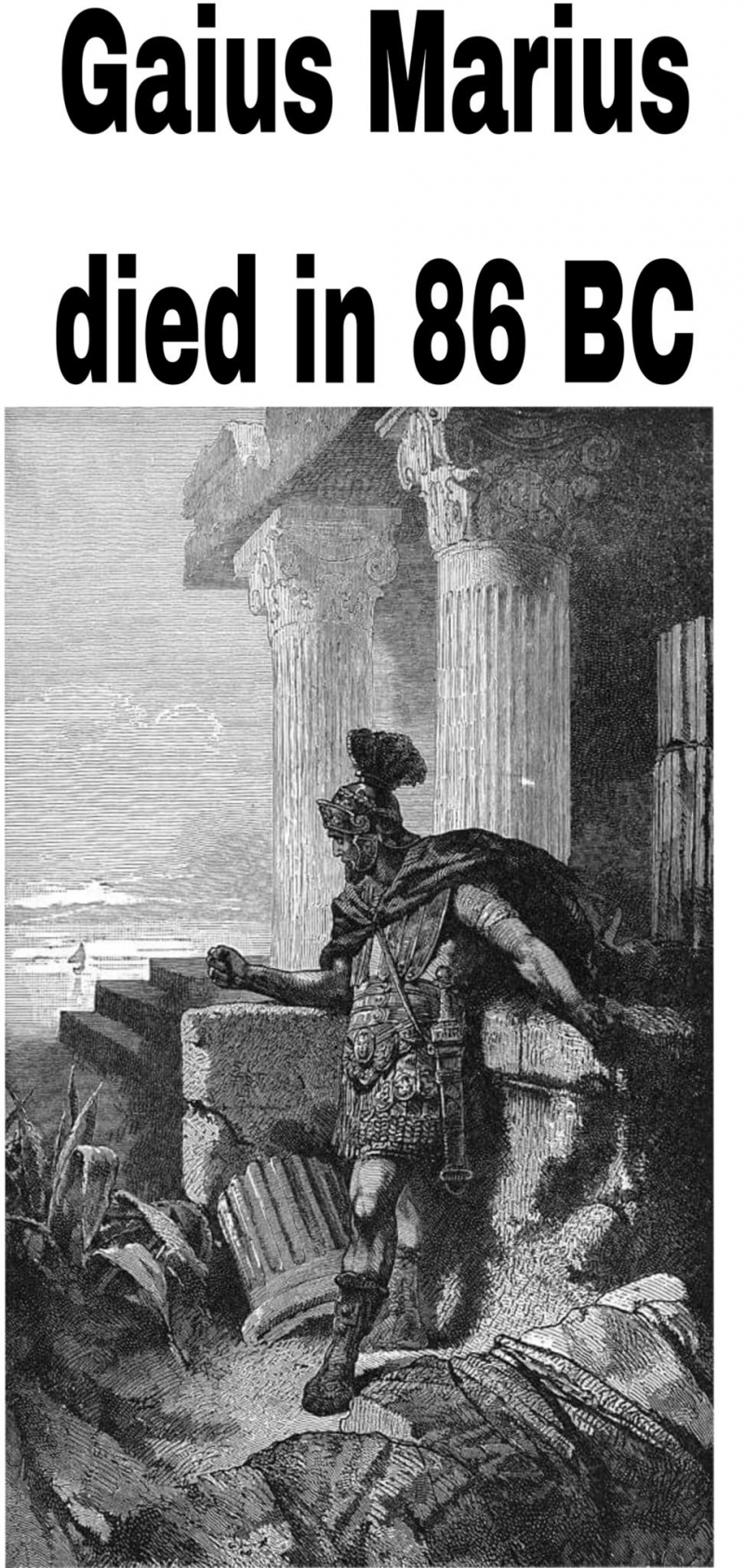
Photo: https://i.pinimg.com/



























